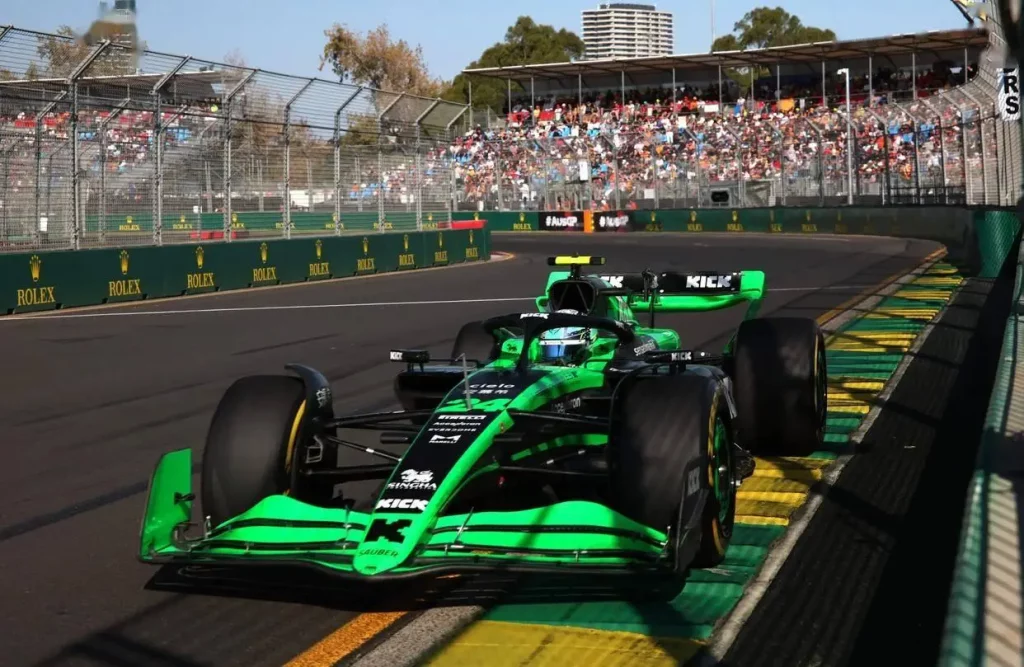Formula 1 competitor Zhou Guanyu has recently shared insights into his departure from the team previously known as Sauber. In a candid reflection, he cited the performance level of the machinery as a significant factor, stating, “The team had the slowest car on the grid, which made us feel held back.” This forthright comment provides a window into the operational challenges faced and underscores his focused perspective on his journey within the pinnacle of motorsport.
Zhou’s time with the outfit, commencing as a rookie in 2022 under the Alfa Romeo banner, spanned a significant three-year period marked by both promising moments and inherent difficulties. Upon entering the highly competitive F1 landscape, he navigated the initial pressures with composure, notably making an immediate impact. His debut race in Bahrain saw him secure a remarkable 10th place finish, earning a valuable point and placing him in an exclusive group as only the 66th driver in the history of the sport to score in their maiden appearance. This early success served to demonstrate his potential and capability at the highest level.
Throughout his tenure, Zhou continued to showcase flashes of pace and skill despite the limitations of the equipment. A memorable highlight included setting the fastest lap during the rain-affected Japanese Grand Prix at the challenging Suzuka Circuit, a testament to his ability to perform under difficult conditions. He also demonstrated impressive qualifying speed on occasions, notably achieving a top-five starting position at the Hungarian Grand Prix, a circuit where driver skill can sometimes help mitigate car performance deficits. These performances, coupled with consistent effort, contributed to him receiving recognition such as Autosport’s Rookie of the Year award and gaining a positive profile among the global fanbase.
Navigating the complexities of Formula 1, particularly when not competing with the front-running teams, requires significant resilience and a clear understanding of the sport’s dynamics. Zhou’s assessment regarding the car’s performance reflects a pragmatic view of the situation faced by both himself and the team. His dedication to his craft and his ambition to compete at the highest possible level are evident in his drive to seek opportunities where he can more fully exploit his talents and contribute to stronger results on track. His journey continues to be one defined by perseverance and a commitment to developing as a driver in the fiercely competitive environment of Formula 1.

However, Sauber’s ongoing poor performance marked a turning point. In 2024, their C44 car frequently faced clutch failures and engine issues; misguided upgrades led them to become one of the least competitive teams on track. Both Zhou and teammate Bottas missed multiple scoring chances due to pit stop errors—leaving them pointless after 21 races. Zhou admitted: “Car performance far outweighs driver skill; having an uncompetitive car made me struggle—even consider quitting.”
Behind Leaving: A Professional Choice Battle
Sauber will transition into an Audi factory team by 2026—with management changes accelerating driver lineup reshuffles. Both Zhou and Bottas are leaving; Brazilian rookie Pourchaire may join forces with Hülkenberg next season. Facing stiff competition for seats—Zhou displayed rare openness saying—“If I lose out to Bottas—I’ll accept it.” However—he stressed—the brutal reality of motorsport means “opportunities are fleeting”—he doesn’t want prolonged waiting.
Despite stepping away from full-time driving duties—Zhou remains connected within F1—in February 2025—joining Ferrari as reserve driver while maintaining contacts with Alpine among others. His Renault youth training background coupled with potential backing from China’s Geely Group positions him well for future returns.
A New Spark for Chinese Racing: From Personal Breakthroughs To Industry Insights
Zhou’s three-year stint isn’t just personal success—it marks significant progress for Chinese motorsports too! At Shanghai’s home track during 2024 Chinese Grand Prix—amidst roaring cheers from tens-of-thousands—he fulfilled fans’ “20-year wait.” Foreign media dubbed this moment—the “awakening” of China’s racing culture!
His departure raises industry questions—how best support drivers competitively? Zhou’s struggles highlight smaller teams’ resource constraints whilst underscoring challenges balancing commercial value vs technical prowess—as he aptly put it—“Racing is teamwork—but drivers need cars showcasing their talent.”

A Promising Future: The Dialectic Of Waiting And Breakthroughs
Zhou’s career mirrors racing against time itself! He admits waiting “no more than one year” before considering other series if unable returning main F1 races—a rational yet dream-anchored decision!
From Sauber through Ferrari—from full-time roles towards reserves—his journey epitomizes both harshness & allure within F1 realms—not merely chronicling individual growth—but symbolizing ‘Chinese Power’ within global motorsport industry—as penned confidently within statements—“I’m optimistic about future; China’s red won’t fade on tracks!”
Conclusion
Zhou & Sauber parting ways signifies complex interplay between technology-business-personal values within professional sports arenas! His perseverance potentially ignites sparks propelling Chinese motorsports onto world stage!
